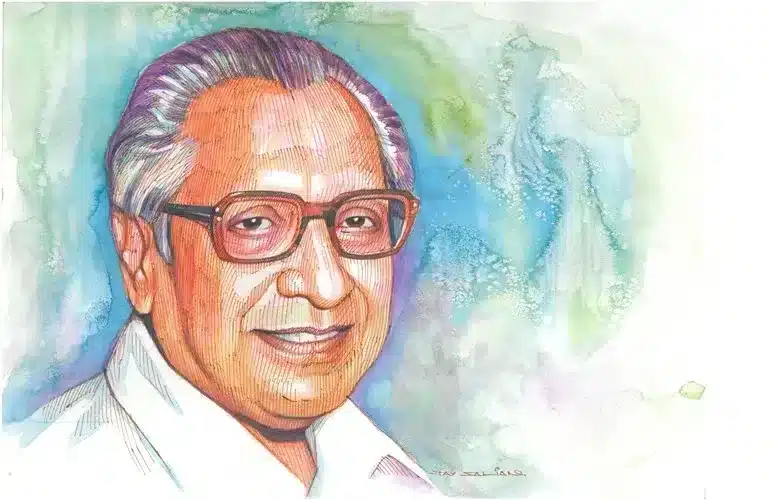Kusumagraj: The Literary Luminary of Marathi Literature

Kusumagraj (27 February 1912 – 10 March 1999) was a Marathi poet, novelist, short story writer, playwright, and humanist.
Life and Career
Kusumagraj was born on 27 February 1912, in Pune, India. He started his primary education in Pimpalgaon and completed his higher education at the New English School of Nashik.
He started his career as a student at H. P. T. College. His poems were published in Ratnakar Magazine. He stood up against the discrimination faced by communities categorized as “untouchables” when he was 20. He joined a nonviolent movement known as Satyagraha in 1932, to support their right to enter the Kalaram Temple in Nashik.
In 1933, he founded the Dhruv Mandal and wrote for a newspaper called Nava Manu. Jeevanlahari his first collection of poetry, came out the same year. He got his Bachelor of Arts degree in Marathi and English in 1934 from H. P. T. College in Nashik. In 1936, he joined Godavari Cinetone Ltd. As well as writing the screenplay for the movie “Sati Sulochana”, he played a role of Lord Lakshmana in it. Also, he’s a journalist for a bunch of magazines and newspapers like ‘Dainik Prabhat’, ‘Saarathi,’ ‘Navayug,’ ‘Saptahik Prabha’ and ‘Dhanurdari’.
His life was changed by a watershed moment in 1942. His collection of poems called Vishukha was published by Vishnu Sakharam Khandekar. His work impressed him. “Kusumagraj was a humanist”, he said, and his work reflected “social discontent” as well as the “optimistic conviction” of a new world.
When his poems were published, the “Quit India Movement” was in full swing. He wrote poetry that was like a manifesto, full of messages of freedom that encouraged people to stand up for themselves. It soon became a favorite for young men and women, and eventually became one of his most famous works.
He also loved playwrights and adapted some of Oscar Wilde’s plays, Shakespeare’s, Moliere’s, and Maeterlinck’s by 1943. He translated Shakespeare plays into Marathi and enriched Marathi theatre. Besides being a poet, he was a novelist, and his first novel was “Vaishnav” in 1946. The periodical “Swadesh” also hired Kusumagraj as an editor from 1946 to 1948. He wrote a play in 1954 called Rajmukut, which was based on Shakespeare’s Macbeth. He wrote a play adapted from Othello in the 1960s, and he composed lyrics for Marathi movies. In 1970, he wrote his most famous play, Natsamrat, based on Shakespeare’s “King Lear”. He died on 10 March 1999, in Nashik, Maharashtra, India.
Social Work
He was actively involved in social work, and he believed in helping the less fortunate. He was a member of the Samyukta Maharashtra movement. His work was to uplift the “Adivasi” communities. It was his belief that everyone should have equal growth opportunities. A charity he founded, the Kusumagraj Pratisthan, works on building libraries and supporting Adivasi communities. He also donated money to the group.
He founded the Lokahitaw*di Mandal in Nashik in 1950. He started an Adivasi Karya Samiti to help educate and provide medical care to the community. He also hosted sports and cultural camps.
Awards and Legacy
In 1974, he was awarded the ‘Sahitya Akademi Award’, and received the Padma Bhushan, in 1991, India’s third-highest civilian award
Read More; Meher Baba, an Indian spiritual master
Observer Voice is the one stop site for National, International news, Sports, Editor’s Choice, Art/culture contents, Quotes and much more. We also cover historical contents. Historical contents includes World History, Indian History, and what happened today. The website also covers Entertainment across the India and World.

